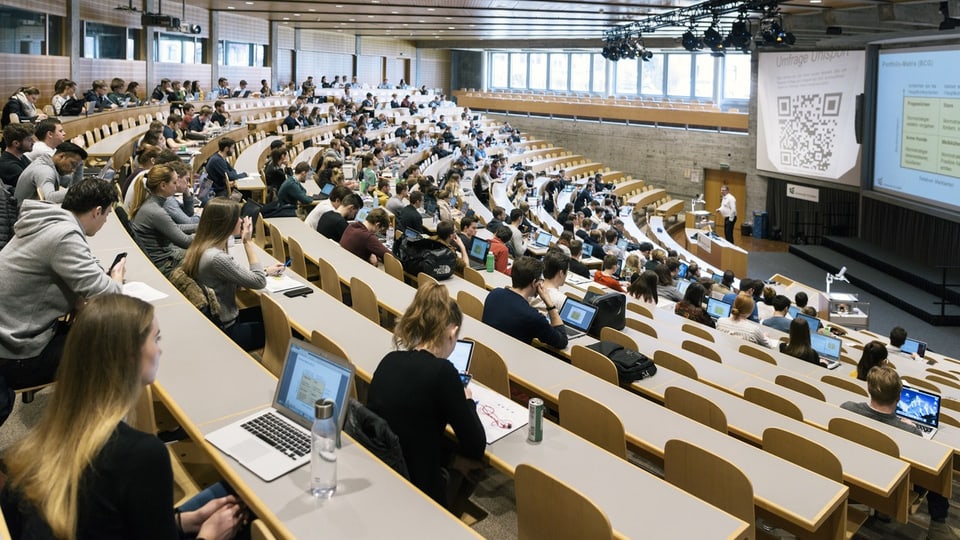Contents
In initial statements, politicians from left to right appear open to the issue: the university is important for northwestern Switzerland.
The University of Basel expects a deficit of 50 million francs for the coming year. In addition to inflation, the background is rising personnel costs and falling income, says Matthias Geering, spokesman for the university: “The university is very worried about this situation.”
Legend:
Almost 13,000 students are enrolled at the University of Basel. The university is aiming for moderate growth in the number of students. (symbol image)
KEYSTONE/Christian Beutler
In 2024, the university will plug the financial hole with reserves. With the money set aside of a good 200 million francs, the University of Basel can remain in the black. “But we can only do business like this for a few years unless there are massive changes in the general conditions,” says Geering.
By “changes in the framework conditions” the university spokesman means income. In concrete terms, this means: The university wants more money from the supporting cantons of Baselland and Basel-Stadt. Geering believes that the university can hardly expect more money from the federal government and other cantons: “Ultimately, in the two Basels you have to ask yourself the political question of which university you want and what it should cost.”
The University of Bern is also threatened with a “structural deficit”
A lack of money is also causing problems for the University of Bern. It ended 2022 with a loss. However, at 8.7 million francs, this is significantly smaller than the 50 million loss that the University of Basel is threatened with.
However, the University of Bern’s prospects are also clouded. It has been receiving the same cantonal contribution for years and is in danger of slipping into a structural deficit, its rector Christian Leumann recently told the “Bieler Tagblatt”. The financial gap could be compensated for with reserves. “But that won’t be possible for much longer.”

Legend:
The good reputation of the University of St. Gallen extends far beyond the country’s borders. The HSG is also doing well financially.
Keystone/Christian Beutler
Other Swiss universities, however, are doing better. The University of Zurich ended the year well, according to last year’s financial report. The so-called third-party funding has even “reached a peak”. In addition, she received 679 million francs, around 60 million francs more from the canton of Zurich. ETH Zurich is also financially well positioned.
The University of Lucerne ended 2022 with a small surplus of just under 20,000 francs. The University of St. Gallen is also doing well.
“Yes, I’m definitely for it.”
The University of Basel believes that the calls for greater support for the university will be met with open ears in the two sponsoring cantons.
“Yes, I’m definitely in favor of it,” says Basel SP councilor Amina Trevisan. Education is Switzerland’s most important resource. Social prosperity is also built on this. “Yes, absolutely,” says Baselland SP district administrator Roman Brunner. The university is important for the business and research location.
Ask foreign students to pay more
Baselbieter SVP district administrator Caroline Mall is more cautious. She also thinks that the cantons could contribute more. “However, there would also be the possibility of thinking about tuition fees,” she says, “especially when it comes to foreign students.”
Discussion about the university’s performance mandate, which applies from 2026, is now beginning in the two Basels. The demand for more money is part of this negotiation. How many millions more the university will demand from the cantons remains to be seen. Nevertheless, their spokesman is already looking positively at the negotiations: “We are confident.”
